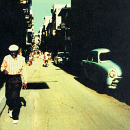
|
Buena Vista Social Club review
:. Director: Wim Wenders
:. Genre: Documentary
:. Running Time: 1:45
:. Year: 1999
:. Country: Germany / USA / Cuba
|
By the end of this lovingly crafted musical documentary you will have been taken by Ruben's quiet charm, Ibrahim's gentle bravado, Compay's sassy dignity, and Omara's Divaness, remaining in awe of their talents several hours after the film ends.
Who are they? They are a fine wine, these musicians on the Grammy winning Buena Vista Social Club album that had been forgotten, both at home and abroad until Ry Cooder uncovered them while in Havana for a project. These musicians range in age from 40-90 with the median age a sprightly 75, and had not been in the public eye or interest for decades. Through word of mouth and organizing, Cooder assembled them to record what came to be Buena Vista Social Club, named after a 50's musician's haunt in Havana. Their collective phoenix rose from the flame ignited by the success of the album. This success prompted Ry Cooder to call on his frequent collaborator, Wim Winders (Wings of Desire, Lisbon Story, Paris Texas), who fell in love with the music and proceeded to film the Buena Vista Social Club on tour in Amsterdam last summer, casually in Havana, and topping it off with an emotional performance at Carnegie Hall in New York City.
That these two are involved in the project is what makes it work. Both have an obvious passion for the sounds and the musicians, but both also stay out of the way and let the musicians do their thing. Ry Cooder narrates some of the film, and musically is not in the foreground, while Wenders' gentle pace is as relaxed and open as the musicians themselves. The respect and dignity with which the musicians are treated is what sets this film apart from other musical documentaries. Wenders understands music and the musicians who create it, and he simply lets them play.
Interspersed with interviews and informal practices, Wenders cuts from a live performance in Amsterdam to an informal practice at Egrem studios in Havana to interviews of these likable characters. One of the gifts of his direction is the long continuous shots that allow you to immerse yourself in the music.
Refreshingly, politics do not color this production. Cuba has always been a heated debate in the States and thankfully no one covers ground that has already been treaded a thousand times over. There is no ridiculous "Inside Castro's Cuba" conspiratorial tone to this film. While we do get a tour of old Havana with Cooder and his son Joachim driving through town, passing through crumbling buildings, architectural treasures, revolutionary slogans, and cars from the forties and fifties, the spotlight is on these amiable musicians who share some about their early years and passions. The tone is intimate, and they focus on their vibrant memories and music.
One of the most beautiful sequences of the film is pianist Ruben Gonzales (father of modern Cuban piano sound) playing in a grand Cuban hall that is now used for ballet, gymnastics, and fencing practice. He provides music as coltish girls awkwardly but seriously and energetically dance, while others practice their tumbles and "En guarde!"s. The harmony of their coupling illustrates just how linked the past and future are in Cuba.
The unassuming 70+ year old vocalist Ibrahim Ferrer is one of the main characters in the movie (his release of a solo album prompted the musicians to get together again in Havana). Wenders follows him casually around the streets of Havana to the streets of New York City, as he shyly shares his story, faith in Saint Lazaro and santeria practices, and voice. One of the most poignant moments in the film that Wenders captures is the expression of pride on his face as they play in Carnegie Hall and the sense of accomplishment of the group as a whole.
The movie reminds us that there are others, not only in Cuba but everywhere, whose moment in the spotlight
has faded but whose genius persists. I remember my friend calling me up, telling me tonight was the night to go to Mama Rosa's, a neighborhood blues bar in Chicago. Ole Pinetop Perkins was playing that night, the pianist in his 70's with a knack for playing roots R&B from the 40's. It was urgent, she told me flatly, because when he dies that music dies with him. So we went and his sound stays with me.
Anji Milanovic

 Buena Vista Social Club: Buena Vista Social Club OST Buena Vista Social Club: Buena Vista Social Club OST
 Buena Vista Social Club in Concert: Los Angeles, California Buena Vista Social Club in Concert: Los Angeles, California
 Compay Segundo: Calle Segundo Compay Segundo: Calle Segundo
 Buena Vista Social Club presents: Omara Portuondo Buena Vista Social Club presents: Omara Portuondo
 Ry Cooder & Manuel Galban: Mambo Sinuendo Ry Cooder & Manuel Galban: Mambo Sinuendo
 Cuba Feature Cuba Feature
 Eliades Ochoa: Sublime Ilusion Eliades Ochoa: Sublime Ilusion
 Documentary Reviews: 1998 - 2011 Documentary Reviews: 1998 - 2011
 Documentary Reviews: 2012 - present Documentary Reviews: 2012 - present
|
|


